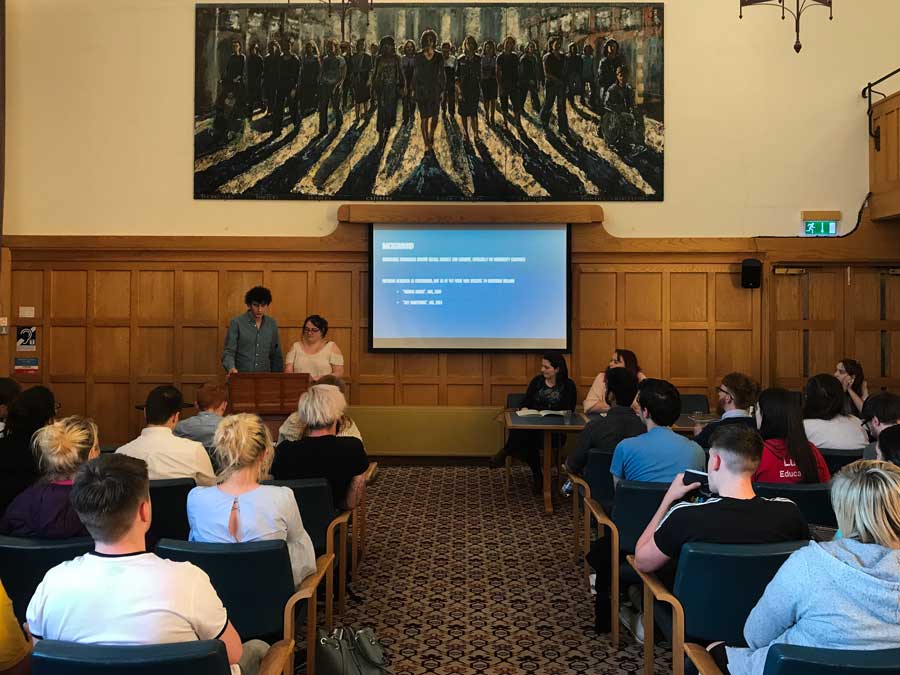A landmark study on non-consensual sexual experiences in Queen’s University Belfast – the first of its kind in Northern Irish higher education – has revealed that nearly 50 per cent of students surveyed stayed quiet about their experience of sexual assault.
The survey found that 46 per cent of those surveyed told no one about their experience of non-consensual penetrative assault or attempted penetrative assault, with few individuals who experienced a serious sexual assault involving non-consensual sex reporting it to the police.
The research also found that, in 38 per cent of cases, victims knew the perpetrator had a link to Queen’s.
While the report gives no overall figure for the number of students to have experienced any kind of sexual assault, the figures give a further indication of the prevalence of non-consensual sex and assaults on university campuses. The survey found that 33 per cent of participants had experienced unwanted verbal comments of a sexual nature, while six per cent of students had experienced at least one episode of sexual penetrative assault. Of that six per cent, nearly 40 per cent of those surveyed had experienced one further episode of sexual assault.
The survey covered sexual assault across all genders and sexualities, with close to 3,100 students taking part in the survey organised by Queen’s University Belfast Students Union (QUBSU) and the Student Consent Research Collaboration, a group of students within the university working to change attitudes towards sexual consent.
Speaking to The University Times, Jessica Elder, the Welfare Officer of QUBSU, said the project, which began two years ago, had given a students “a voice they didn’t have before”. Students, she said, are engaged on the issue and want more information. Just this month, QUBSU announced they would be running consent workshops for first-year students, making them the latest students’ union to run consent classes.
The survey found that 56 per cent of students surveyed in Queen’s wanted more education on consent.
The “Stand Together” survey makes a number of key recommendations. These include stressing the need for more “robust fact based education” to be introduced across Northern Ireland and the introduction of a sexual violence policy in Queen’s to encourage students to report incidents.
Despite the high rates of responses on the issue of sexual assault, only 6.4 per cent said they considered themselves to have been sexually assaulted.
Speaking at the launch of the report in Belfast this evening, Síona Cahill, the Vice-President for Equality and Citizenship in the Union of Students in Ireland (USI, said sexual assault is a problem students have to address: “It’s a problem and it’s growing and we’re not going to stand here and do nothing and wait for someone else to act.”
Student activists, she said, “have led the way in highlighting the issue of consent on our campuses”.
On the issue of drugs and alcohol, 70 per cent of those who have suffered a non-consensual penetrative assault indicated that the perpetrator was under the influence of drugs or alcohol at the time the act was carried out. A high percentage of those who have experienced either form of assault did not report the act to anyone with the survey putting the figure at 44 per cent. Of the number of who chose not to report it, 63 per cent believed it wasn’t serious enough while 35 per cent believed it not to be a crime.
Nearly 70 per cent of those who had experienced a non-consensual penetrative assault believed it to have had a negative effect on their mental health with 49 per cent indicating that they missed class as a result.
The study gathered specific data on issues relating to sexual consent, including sexual assault, harassment and consent on and off campus. It also examined the role of alcohol and drug abuse and their effect on sexual consent as well as how these experiences impact on students’ wellbeing and whether or not they chose to report these incidents to official bodies.
In a press statement, founder of the Student Consent Research Collaboration group, Eimear Haughey, said: “This is the beginning of a journey to improve support for survivors of sexual violence, enhance young people’s understanding of sexual consent and ultimately lower the rates of sexual crimes.”
The overall findings from the survey are in line with national research carried out by the National Union of Students (NUS) and USI on a number of issues relating to sexual consent.
It is hoped that through Queen’s engagement with this issue that the specific recommendations from this survey will inform future research and planning on how campuses can be made safer in Northern Ireland.
The findings of the survey come a number of weeks after QUBSU decided to adopt Trinity’s model on sexual consent classes.
John Devaney, Senior Lecturer at the School of Social Sciences, Education and Social Work in Queen’s said in a press statement that ‘’throughout the study the SCORE team have been committed to using the knowledge gained through the research to inform best practice – and it is positive to see the University engage with the important findings and the implications for both the institution and wider society’’.
Dominic McGrath contributed reporting to this piece from Belfast.







